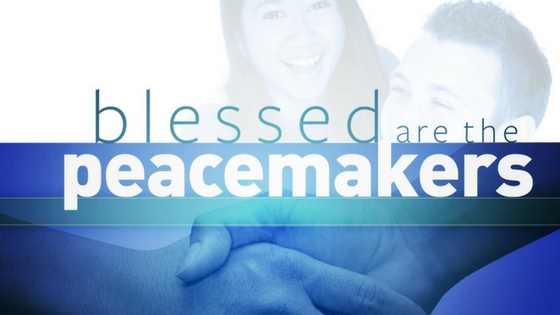
In today’s message at the Hi-C service, we discuss some recent events and what it means to be a peacemaker.
Scripture Passage
Ephesians 2:14
For he is our peace; in his flesh he has made both groups into one and has broken down the dividing wall, that is, the hostility between us.
Message Text
This past week, there were 2 people shot to death by police officers:
- Terence Crutcher of Tulsa, Oklahoma
- Ketih Scott of Charlotte, North Carolina
In the first death, the victim was unarmed.
In the second death, the facts are unclear at the moment, especially because the police department is not releasing the videotapes of the actual shooting.
The commonality among these two deaths? The victims in both cases were black.
In Charlotte, there have been massive protests throughout the city. Here are some images of the protest this past week:
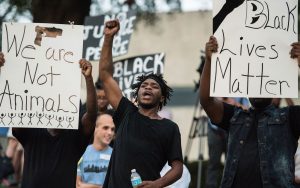
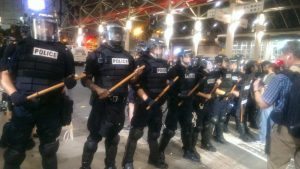
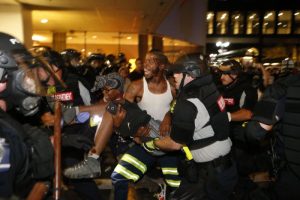
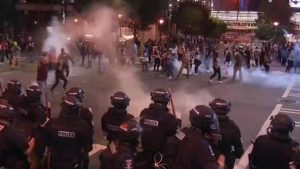
While the issues being protested are complex, there are 2 main camps:
- The protests under recognized banners like Black Lives Matter and people that support them
- The police and people who support them
While I can’t fully dissect the issues at play in a short message, it’s worth noting some main points of view from both sides.
For Black Lives Matter and those supporting the protest:
- There has been a long history of state-sanctioned violence against black people, and these shootings are just examples of this long history
- Black people have been specifically and systematically targeted for repression, discrimination, segregation and elimination
- None of these injustices have really been acknowledged or paid attention by the mainstream of society and the media
- Now that people are protesting, the media, instead of discussing these long-simmering issues, focus instead on the few random acts of violence by a small segment of protesters
- The history of these victims of the shootings are scrutinized to somehow justify their deaths
From the point of view of police and those supporting them:
- The police put their lives on the line and at risk everyday in their jobs
- When they do react, they are responding to imminent threats on their lives
- When people protest in the manner that is highlighted in the media, they are showing disrespect and lack of appreciation for the difficult job they do
There is much more, obviously, but what we see is this: both sides are entrenched in their views and with heavy emotion on both sides.
The Scripture passage from today states that Christ is our peace, that he has made both groups into one, has broken down walls that divide us, that is, the hostility between us.
When I look at a situation like this, is this really the case? Can peace be possible? Can both groups be made into one? Can hostility be broken down?
Or is this just naïve idealism and wishful thinking?
As Christians, when we read a text like this, do we just dismiss it as nice words but not relevant to the real world?
The issue of race and racism has a very long and complex history in the United States. In fact, the very history of that country is built upon the extermination of one group – the Native Americans – and the forced enslavement of another – the African Americans.
Here in Canada, our history is nothing to pat our backs on either: we have an atrocious history when it comes to our Aboriginal peoples, a tragic legacy that continues today. In our cities like Toronto, anti-black racism exists in many forms, sometimes more subtle and less visible, but there nonetheless. This tension is often seen in relations with police. In my time as a criminal lawyer, I saw many of these issues firsthand.
I encourage you to learn more about these issues. The best way is to just read things on your own. To take it to the next level, I’d love to see more of you study these things in university and even become experts on such issues.
Whatever the case, here in this text, our calling as children of God is clear: we are called to bring peace and be peacemakers.
This can be in a small group among friends at school who are not getting along; or at a bigger scale in society dealing with complex issues like race relations. Jesus calls us to bring peace, to break down dividing walls and hostility.
If we are truly the children of God – if this is what our identity is – then we cannot just be passive observers to what happens around us and just take care of ourselves. We are called to bring peace to this world!
But how do we do that?
To bring peace to those around us, we must first have peace within us, in our own hearts.
Without peace in our hearts, we cannot bring real peace to those around us.
When we are at peace in our hearts, we will be aware of what is going on in our own hearts, see under the surface of what is going on in the hearts of others, and thus be in a place to offer wisdom.
But how difficult it is to find this peace in our hearts! This is perhaps the greatest challenge we face.
We as human beings are walking contradictions. In our hearts, we want to do something nice and say something nice, but we find ourselves doing the opposite.
The apostle Paul articulated this very eloquently in Romans (Romans 7):
15 I do not understand my own actions. For I do not do what I want, but I do the very thing I hate.
18 For I know that nothing good dwells within me, that is, in my flesh. I can will what is right, but I cannot do it. 19 For I do not do the good I want, but the evil I do not want is what I do.
22 For I delight in the law of God in my inmost self, 23 but I see in my members another law at war with the law of my mind, making me captive to the law of sin that dwells in my members. 24 Wretched man that I am! Who will rescue me from this body of death?
In our deepest selves, we are often at war. As a teenager, you’re trying to figure things out: who you are, what this world is like, what life is about. And within yourselves, you’re probably going through many conflicting emotions, thoughts, feelings and behaviours. You’re probably quite confused at times about your own thoughts and actions.
If these contradictory thoughts and actions are not acknowledged, addressed and dealt with, this can leave you mired in guilt, frustration, anger and hopelessness.
This may be a reason why you often might feel a distance between yourselves and your parents – because as well-meaning as they might be, they can’t understand all these things that are going on in your hearts and minds.
How can we find peace with all these things going on in our hearts?
25 Thanks be to God through Jesus Christ our Lord!
Jesus said this:
Matthew 11:28-30
28 “Come to me, all you that are weary and are carrying heavy burdens, and I will give you rest. 29 Take my yoke upon you, and learn from me; for I am gentle and humble in heart, and you will find rest for your souls. 30 For my yoke is easy, and my burden is light.”
Remember my message about prayer?
It is about opening our hearts and being honest before God. We ask God to come in and search our hearts. “O God, all these confusing contradictions and thoughts going on in my heart, please come and shine your light on them!”
We lay our burdens at the feet of Jesus and we bring out what’s on our hearts to him.
My friends, we need to find this peace, this true peace. Because it’s not just about us. Yes, if we accept our identity as God’s children, then we find peace and joy in being loved by Him. But we do not stop there: the world cries out for a peace that the world cannot give.
It needs peacemakers. We are called to be peacemakers.
As you go along in high school, you’re thinking about careers and school. There is a lot of talk about different programs, what their cut-off marks are, what grades you need, etc.
My prayer is that you will come to God as you consider these questions.
My prayer is also that you will be a generation that seeks God’s will to be peacemakers in a world that needs it desperately.
I believe that only being in a real relationship with God and being rooted in the Word of God – being solidly grounded in biblical principles – can we first be transformed so that we may in turn change the world.
We’re not all called to be great figures or do things on a global scale, but we are all called to be transformative people wherever we might be.
May God bless each of us in our journeys. May we find peace in God in our hearts, and may God lead us to be peacemakers wherever we are.
Amen.

Leave a Reply